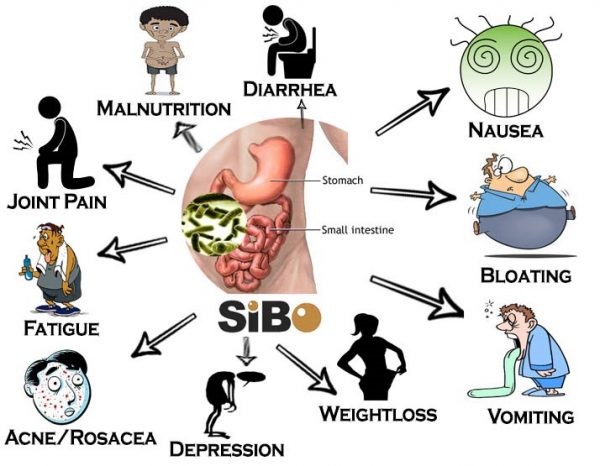

Furthermore, results from multiple clinical studies have shown that treatment with antibiotics can reduce or eradicate SIBO and improve symptoms of IBS, evidence that further supports the role of SIBO in IBS. In studies using lactulose or glucose breath testing, SIBO was detected in up to 84% (Range 4-84%) of patients who met Rome I or Rome II criteria for IBS. A potential link between SIBO and IBS has been suggested by symptom similarities (eg, abdominal discomfort, bloating, and flatulence) and by the reported prevalence of SIBO in patients with IBS. Small intestinal bacterial overgrowth involves abnormal growth (ie, >10 5 colony forming units/mL) of endogenous bacteria in the small intestine resembling those normally found in the colon. The pathophysiologic mechanisms contributing to IBS are not fully understood, but an emerging hypothesis suggests that small intestinal bacterial overgrowth (SIBO) may contribute to IBS pathophysiology. Additional symptoms of IBS may include abdominal bloating and flatulence, but specific GI symptoms often vary among patients. Irritable bowel syndrome is characterized by abdominal discomfort associated with altered bowel habits including constipation, diarrhea, or alternating periods of constipation and diarrhea.

Thus, the economic burden of IBS in the United States is substantial and includes estimated direct costs (eg, physician visits) of $1.7 to $10 billion annually and estimated indirect costs (eg, employee absenteeism) of up to $20 billion annually. Results of a large US survey (N = 5430) showed that individuals with IBS missed substantially more workdays per year (mean, 13.4 days) compared with individuals without a functional GI disorder (mean, 4.9 days). Symptoms of IBS can substantially impact patients' quality of life, and the effect of IBS on physical and psychological health can negatively impact the workplace. Irritable bowel syndrome affects females approximately twice as often as males and is most frequently diagnosed in individuals between the ages of 30 and 50 years. Irritable bowel syndrome (IBS) is the most commonly diagnosed chronic functional gastrointestinal (GI) disorder and has an estimated prevalence of 10% to 15% in North America. Identification of possible predictors of SIBO in patients with IBS could aid in the development of successful treatment plans. Older age and female sex were predictors of SIBO in patients with IBS.

Small intestinal bacterial overgrowth was present in a sizeable percentage of patients with IBS with predominance of bloating and flatulence. There was no significant correlation between the presence of SIBO and the predominant bowel pattern or concurrent use of tegaserod, proton pump inhibitors, or opiate analgesics. Hydrogen was detected more frequently in patients with diarrhea-predominant IBS (OR, 8 95% CI, 1.4-45), and methane was the main gas detected in patients with constipation-predominant IBS (OR, 8 95% CI, 1.3-44). Results of the glucose breath test, which measures hydrogen and methane levels in the breath, were considered positive for SIBO if 1) the hydrogen or methane peak was >20 ppm when the baseline was 55 years of age (odds ratio, 3.6 95% confidence interval, 1.4-9.0) and in females (OR, 4.0 95% CI, 1.1-14.5). Breath samples were obtained at baseline and at 30, 45, 60, 75 and 90 minutes after ingestion of 50 g of glucose dissolved in 150 mL of water. MethodsĪdults with IBS based on Rome II criteria who had predominance of bloating and flatulence underwent a glucose breath test (GBT) to determine the presence of SIBO. The purpose of this study was to identify potential predictors of SIBO in patients with IBS. Recent data suggest that SIBO may contribute to the pathophysiology of Irritable bowel syndrome (IBS). Small intestinal bacterial overgrowth (SIBO) is a condition in which excessive levels of bacteria, mainly the colonic-type species are present in the small intestine.


 0 kommentar(er)
0 kommentar(er)
